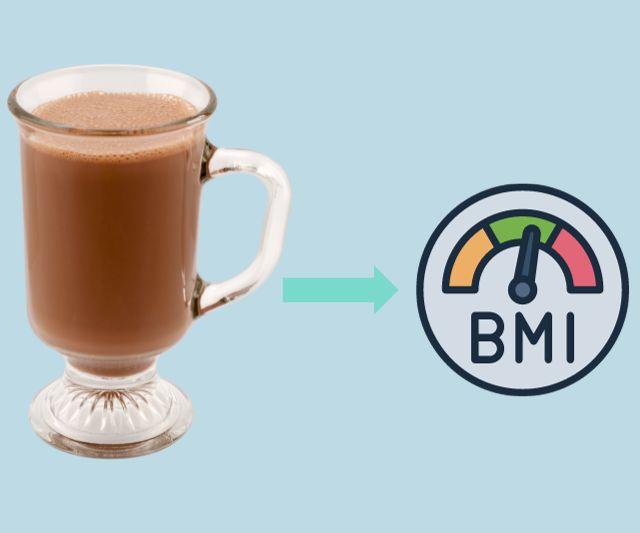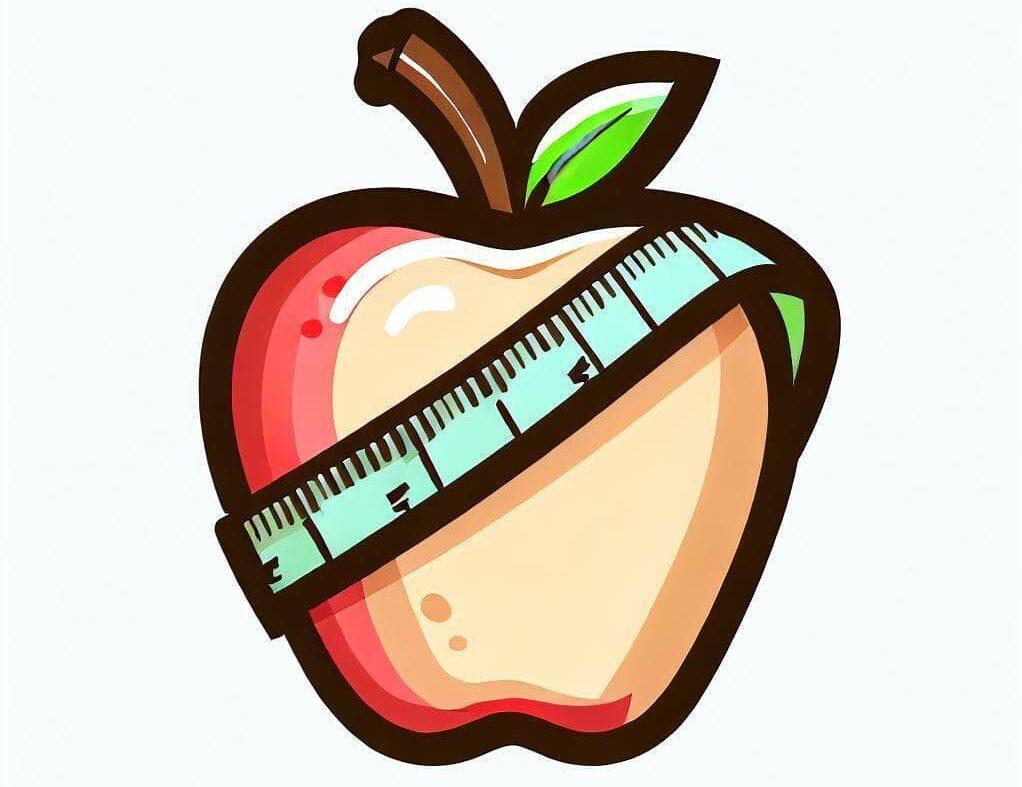Is Hot Chocolate Good For Weight Loss?
This post may contain affiliate links which means I may receive a commission for purchases made through links at no extra cost to you. See my disclosure policy for more information.

Especially in the winter months, there is nothing better than a warm drink that makes you feel like you are protected by a nice fuzzy blanket. Even better when that drink is sweet on top of it.
All that is great but is hot chocolate good for weight loss or not? the answer is it depends on the ingredients you used to make it. A typical hot chocolate drink has 24 g of sugar per 1 hot cup.
And when you are trying to lose weight the goal is to keep your overall diet low sugar, maybe limiting it to around 10 tsp (40 g) a day.
But as you can see just one cup of hot cocoa can take around 6 tsp of that daily limit. So the short answer is that a typical hot chocolate is not good for weight loss.
But you have to stick around for the long answer as I unpack the why behind it in detail and give you tips on how you can make a weight-loss-friendly hot chocolate.
Nutritional Value Of Hot Chocolate
As per the USDA, 1 cup of hot chocolate contains the following nutrients:
Serving Size: 1 cup (250 g)
Calories: 192
Protein: 8.8 g
Carbs: 26.8 g
Sugar: 24.2 g
Fiber: 2.5 g
Fat: 5.8 g
Ingredients in a typical hot chocolate
Milk
Chocolate
Cocoa powder
Sugar
Vanilla extract
Potential Benefits Of Hot Chocolate For Weight Loss
Hot Chocolate Might Help with BMI

There’s a study that looked into whether eating dark chocolate or cocoa can help you lose weight or change your Body Mass Index (BMI).
The researchers checked out 35 different studies to see if eating cocoa or dark chocolate changes your body weight, BMI (a way to measure body fat), or waist size.
What they found is that for most people, just drinking hot chocolate isn’t going to make a big difference in losing weight or shrinking their waist.
But, there’s a catch. The study did find something when people had a lot of cocoa or dark chocolate (like 30 grams a day) for a few weeks (about 4 to 8 weeks).
In these cases, people did see a bit of weight loss and a lower BMI.
So, what does this all mean? The study shows that cocoa and dark chocolate, which are in hot chocolate, might help with weight loss and reducing BMI, but only in certain amounts and for certain lengths of time.
It’s important to remember, though, that this doesn’t work the same for everyone. And the study wasn’t exactly about hot chocolate as a drink, but more about the ingredients in it.
The Cocao in it May Help Reduce Your Appetite

A study focusing on cocoa compounds provided some insights that suggest that it may suppress your appetite just a tiny bit.
This study wasn’t about hot chocolate directly, but it looked at certain ingredients found in cocoa, which is a key component of hot chocolate.
Researchers were curious to see if compounds like epicatechin and procyanidins in cocoa could make people feel less hungry.
They tested this by giving different cocoa-based drinks to a group of healthy young men and then seeing how much pizza they ate afterward.
What they found was a bit specific. When they just used a cocoa mixture without any special processing (non-alkalized), it didn’t change how much pizza the guys ate compared to a placebo drink.
But, when they added a higher dose of epicatechin to this cocoa mixture, the men ate about 18.7% less pizza than they did with the placebo. This suggests that epicatechin, a compound in cocoa, might help reduce appetite when consumed in larger amounts.
So, what does this mean for hot chocolate? Well, it’s not a clear-cut answer. If your hot chocolate has a high cocoa content and possibly a good amount of epicatechin, it might help you feel less hungry.
But remember, this study was about specific compounds in cocoa, not hot chocolate as a whole. Plus, everyone’s body reacts differently to foods and drinks.
In short, there’s a chance that hot chocolate could make you less hungry, but I can’t say for sure. It’s something that needs more research.
It May Help Improve Your Mood

Some evidence suggests that flavonoids found in cocoa are good for your brain in a way where it may improve your mood.
This is interesting because when we feel good, we often make better choices about what we eat. And making good food choices is a big part of losing weight.
But, again, this study wasn’t about hot chocolate’s impact on your mood. It’s more about how the cocoa in hot chocolate can help with your mood. I am just evaluating the evidence either way and paint an honest picture for you.
The point is that if you’re feeling good, you may find it easier to stick to your diet.
Another point to consider is the comforting effect of drinking a warm beverage.
The simple act of enjoying a hot drink like hot chocolate can provide a sense of warmth and comfort, potentially contributing to an improved mood.
Downsides Of Hot Chocolate For Weight Loss
It Has a High Sugar Content
Regular hot chocolate comes with high amounts of added sugar. I’ll explain why this is bad for weight loss.
Basically, sugar is made up of glucose and fructose.
When you consume sugar, enzymes in the small intestine break down sucrose into glucose and fructose. Glucose is absorbed into the bloodstream, which causes a rise in blood sugar levels.
This triggers the pancreas to release insulin, a hormone that helps cells absorb glucose to use as energy.
Excess glucose not immediately needed is converted into glycogen and stored in the liver and muscles. However, there’s a limit to how much glycogen can be stored.
Once these stores are full, additional glucose is converted into fat.
Unlike glucose, fructose is primarily processed in the liver. In moderate amounts, the liver can convert fructose to glucose and store it as glycogen.
However, the liver’s capacity to store fructose as glycogen is limited. When you consume more fructose than the liver can handle, it starts converting the excess into fat through a process called lipogenesis.
This fat can accumulate in the liver, potentially leading to weight gain.
It Can Have High Calories
Depending on the preparation, hot chocolate can be high in calorie content, which can lead to weight gain. For instance, a medium hot chocolate from Dunkin’ contains 330 calories and 46 grams of sugar.
Consuming high-calorie drinks can also have a psychological impact. They are often not counted as ‘real food’ in some people’s minds, leading to underestimation of calorie intake.
There can also be a compensation effect, where you might reward yourself with high-calorie foods or drinks after engaging in healthy behaviors like exercise, negating the calorie deficit created by the exercise.
It Can Create a Dependency On Sweet Flavors’
Human taste preferences are not static; they can adapt and change over time based on dietary habits.
Regular consumption of sweet foods and beverages can condition your taste buds to prefer and crave these flavors.
Sugar triggers the release of dopamine in the brain, a neurotransmitter associated with pleasure and reward.
This response can create a ‘feedback loop’, where the consumption of sugar leads to feelings of pleasure, reinforcing the habit of consuming sweet items.
Over time, this can lead to a form of dependency where the brain starts to associate sweet flavors with a reward, making you more likely to seek out these flavors.
Both of these changes can make it harder to lose weight because you might crave more sugary, high-calorie foods and find it tough to enjoy healthier, less sweet options.
Tips For Adding Hot Chocolate In a Weight Loss Diet
Make Your Own Hot Chocolate
When you have homemade hot chocolate, you have the advantage of controlling what goes into it.
This is in contrast to buying it from places like Starbucks or Dunkin’ Donuts, where the drinks often come with a lot of added sugar, which can be counterproductive to weight loss goals.
By making hot chocolate yourself, you can choose ingredients that align with your weight loss plan
Limit Added Sugars or Use Artificial Sweeteners
Cut down on the sugar content in your hot chocolate. You can do this by either reducing the amount of added sugar or using artificial sweeteners.
Sweeteners like stevia or sucralose can provide the sweetness without the extra calories.
Just be mindful of the type and amount of sweetener used, as some people may be sensitive to certain artificial sweeteners.
Use Unsweetened Cocoa Powder
Instead of using pre-mixed hot chocolate powders that often contain added sugars and preservatives, opt for unsweetened cocoa powder.
This allows you to control the amount and type of sweetener added. Plus, pure cocoa powder is rich in antioxidants and can offer health benefits.
Use Plant-Based Milk to Reduce Fat Content
Swap out whole milk or cream for plant-based alternatives like almond milk, soy milk, or oat milk.
These options generally have lower calorie and fat content compared to cow’s milk.
Choose unsweetened varieties of plant-based milk to avoid extra sugars.
Time it After Your Workout
Consuming your hot chocolate post-workout can be beneficial.
After exercise, your body is in a state where it is replenishing energy stores and repairing muscle tissue.
The carbohydrates in hot chocolate can help replenish glycogen stores, and if you add a scoop of protein powder, it can also aid in muscle recovery.
Just be sure to keep the overall caloric content in mind.
Alternatives To Hot Chocolate For Weight Loss
Green Tea
Green tea is often associated with weight loss due to its bioactive compounds, particularly catechins like epigallocatechin gallate (EGCG).
Studies suggest that EGCG may slightly increase thermogenesis (heat production in the body) and fat oxidation, potentially aiding in burning more calories.
However, the extent to which this contributes to significant weight loss is still debated among researchers.
The caffeine content in green tea might also play a minor role in boosting metabolism.
It’s important to note that the effects are usually modest and best realized when combined with a healthy diet and exercise.
Also Read: Best Time To Drink Green Tea For Weight Loss
Chai Tea
Chai tea, a traditional Indian beverage, is a blend of black tea and spices such as cinnamon, cardamom, cloves, and ginger.
These spices are believed to have thermogenic properties, which may help in increasing the body’s metabolic rate.
For instance, cinnamon is studied for its potential impact on blood sugar control, which could indirectly support weight management.
However, the direct relationship between chai tea consumption and significant weight loss is not clearly established.
The key is to consume chai in its traditional form – without the high-calorie additions like sugar and cream often found in commercial preparations.
Also Read: Is Chai Tea Good For Weight Loss?
Turmeric Tea
Turmeric tea contains curcumin, a compound that has been studied for its anti-inflammatory and antioxidant properties.
There is some emerging evidence that curcumin might influence body fat and metabolism.
For example, some animal studies suggest that curcumin may reduce the formation of fat tissue and improve insulin sensitivity.
However, translating these findings to significant weight loss effects in humans requires more research. Turmeric tea, when consumed without added sweeteners, can be a low-calorie addition to a diet.
Also Read: Best Time To Drink Turmeric Tea For Weight Loss
Matcha Tea
Matcha, a form of powdered green tea, has garnered attention for its concentrated catechin content.
Since you consume the whole leaf in powdered form, it’s believed that matcha might provide more potent benefits than regular green tea.
Some research suggests it may enhance fat oxidation, but like other teas, the overall impact on weight loss is likely to be subtle.
It’s also worth noting that matcha has a unique amino acid profile, including L-theanine, which might have stress-reducing properties – an indirect benefit for weight management, considering the role of stress in eating behaviors.
Also Read: Best Time To Drink Matcha Tea For Weight Loss
Moringa Tea
Moringa tea is derived from the leaves of the Moringa oleifera plant, which is rich in vitamins, minerals, and antioxidants.
There’s limited but growing interest in moringa’s potential effects on metabolism and fat storage.
Some animal studies indicate that moringa might help reduce fat formation and improve fat breakdown.
However, conclusive evidence in humans is sparse, and more research is needed to establish its efficacy for weight loss.
Also Read: Best Time To Drink Moringa Tea
Oolong Tea
Oolong tea, a traditional Chinese tea that is partially oxidized, has been studied for its potential metabolic benefits.
Some research suggests that oolong tea may enhance lipolysis (the breakdown of fats) and increase energy expenditure.
The polyphenol compounds in oolong tea are believed to be responsible for these effects. However, the impact on weight loss is not fully understood and is likely to be moderate.
Oolong tea is usually consumed without milk or sugar, making it a low-calorie choice.
Conclusion
Hot chocolate is a yummy and cozy drink, but when you’re trying to lose weight, you have to think about what’s in it.
It’s usually got a lot of sugar and calories, which might not be great for losing weight.
But if you make it with less sugar, use cocoa powder without sugar, and pick milk that doesn’t have a lot of fat, you can still enjoy it sometimes without messing up your diet.
FAQ
Does hot chocolate burn belly fat?
No, hot chocolate does not specifically burn belly fat. Weight loss, including a reduction in belly fat, generally requires a calorie deficit and cannot be achieved by any particular food or drink alone.
What are the benefits of drinking hot chocolate?
The benefits of hot chocolate include its content of antioxidants from cocoa, potential mood enhancement due to the presence of compounds like flavonoids and theobromine, and providing a source of nutrients like calcium and magnesium if made with milk.
Is hot chocolate more fattening than coffee?
Generally, yes. Hot chocolate is usually more fattening than coffee because it typically contains more calories from added sugars and milk or cream. Plain coffee is very low in calories.
How healthy is hot chocolate?
The healthiness of hot chocolate depends on the ingredients used. Traditional hot chocolate with added sugars and full-fat milk can be high in calories and sugar. However, if made with unsweetened cocoa powder, minimal added sugar, and low-fat milk, it can be a healthier option.
This post may contain affiliate links which means I may receive a commission for purchases made through links at no extra cost to you. See my disclosure policy for more information.
Rahul is a professional nutritionist certified by the International Sports Sciences Association (ISSA) and a personal trainer certified through the American Council of Exercise (ACE). He has a special interest in the science of nutrition and how it can impact the body.
